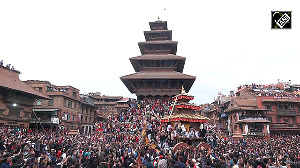The Reserve Bank of India is likely to persist with a soft rate policy to spur Asia's third-largest economy, grappling with uncertainty over monsoon rains after a drought hit growth last year, analysts said.
Central bank policymakers are due to meet on April 29 to review the economy and set monetary policy for the first half of the financial year 2003-04.
India's southwest monsoon is vital for the health of the world's 12th largest economy as agriculture accounts for around 25 per cent of gross domestic product and drives rural demand.
The RBI's decision on whether to keep rates at current levels or push them lower will take into account such factors as rising prices, renewed demand and industrial revival.
"The Reserve Bank has considerable leeway as globally rates are coming down and the bias is towards softer rates in the next six months," said Saumitra Chaudhuri, economist with credit rating agency ICRA.
"So the bank is structurally leaning towards softer rates. I expect interest rates at the short end to come down."
India's central bank cut the benchmark bank rate to a 29-year low of 6.25 per cent in October to insulate the economy from the effects of the country's worst drought in 15 years.
The weather office says it expects this year's southwest monsoon, which runs from June to September, to be below normal, but a repeat of last year's devastating drought was unlikely.
Monsoon key to growth
"The forecast of below normal rainfall is disappointing as it goes against consensus expectations of a mild economic recovery in the current fiscal year following last year's severe drought," said Rajiv Malik, economist with Singapore-based JP Morgan.
The government expects the economy to grow 6.0 to 6.5 per cent in the fiscal year to March 2004.
But the forecast is way below double-digit levels needed to cut mass poverty in the world's second-most populous country, and is also short of the 8.0 per cent growth target the government has set for the next five years.
By comparison, the Chinese economy, India's key competitor, grew 9.9 per cent in first quarter of 2003.
Last year's drought was blamed for pulling down economic growth to 4.4 per cent from 5.6 per cent the previous year.
Analysts said higher inflation may force the central bank to adopt a cautious monetary policy as a drop in farm output in the current year could push up food prices.
"It will lead to a divergence of demand from the industrial sector to the farm sector as people are likely to buy grains and postpone purchase of goods," said D H Pai Panandikar, president of private economic think tank RPG Foundation.
Higher demand for manufactured products pushed India's annual inflation, measured by the widely tracked wholesale price index, to 6.24 per cent on March 29 from 5.99 per cent a week earlier.
In the 11 months to February 2003, the industrial sector grew 5.7 per cent from a year earlier, compared with 2.6 per cent in the corresponding period last year.
(Additional reporting by Anirban Nag and Surojit Gupta)







 © 2025
© 2025